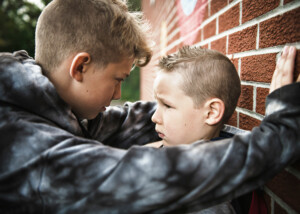
Some kids never get bullied. Are their parents different than the ones of kids who DO get bullied?
Do bully-proof children have different kinds of parents?
Certainly it’s not freak chance or luck that a child or teen is bully-proof–and I don’t mean because that child is a bully.
So what kind of parents do kids have who never get bullied, or the so-called bully-proof children?
There’s a lot out there on “bully-proofing” your children.
“There is no such thing as a bully-proof child,” says Rona Novick, PhD, who developed the BRAVE bully prevention program.
Dr. Novick, a clinical psychologist, has worked with schools nationally on the issue of bullying, and is director of the Fanya Gottesfeld Heller Doctoral Program at Yeshiva University, NY.
“Bullying is so common, virtually all children will experience it at some point in their school career (current research suggests rates over 90%).”
Be aware that there are different levels of bullying; bullying is on a continuum.
Some kids are bullied only within their circle of friends, while others are the individuals whom “everyone picks on.” And interestingly, some victims even become friends with their bullies eventually.
“In addition, since bullies tend to target victims who react emotionally, and since emotional reactivity is largely a factor of temperament and biological, parents can’t change a reactive child into a cool cucumber,” explains Dr. Novick.
The term “bully-proof,” then, can simply mean doing what you can, as a caring parent, to minimize the risk of bullying.
And this begins by supporting a child’s social development, says Dr. Novick. Being more alone, she says, puts a young person at higher risk of being bullied.
Type of parents to create a more bully-resistant child?
Parents must help their children make and keep friends. However, this can’t be forced any more than you, as an adult, can be forced to feel genuine kinship with a coworker whom you don’t care for.
Lead and encourage, but don’t force play dates or other unwanted interactions.
Another group of individuals who are highly vulnerable to being harassed at school are those with cross-gender behavior or same-gender attraction.
Tomboys, effeminate boys, and gay-lesbian, transgender and questioning-youth are very vulnerable to bullying and also benefit from parental support, explains Dr. Novick.
Thus, if parents have noted that a child doesn’t seem to be snuggly fitting into society’s expectations of their gender, parents need to show unconditional love and avoid criticizing their son or daughter.
This non-judgmental approach can go a long way in “bully proofing” a child — or to put it another way, ensuring that your child is one who never gets bullied in the true sense of the word.
 Dr. Novick is recognized for her expertise in behavior management and child behavior therapy. She has published scholarly articles on school applications of behavior management, children and trauma, and bully prevention in schools.of Parents Do Kids Who D
Dr. Novick is recognized for her expertise in behavior management and child behavior therapy. She has published scholarly articles on school applications of behavior management, children and trauma, and bully prevention in schools.of Parents Do Kids Who D
 Lorra Garrick has been covering medical, fitness and cybersecurity topics for many years, having written thousands of articles for print magazines and websites, including as a ghostwriter. She’s also a former ACE-certified personal trainer.
Lorra Garrick has been covering medical, fitness and cybersecurity topics for many years, having written thousands of articles for print magazines and websites, including as a ghostwriter. She’s also a former ACE-certified personal trainer.
.


























